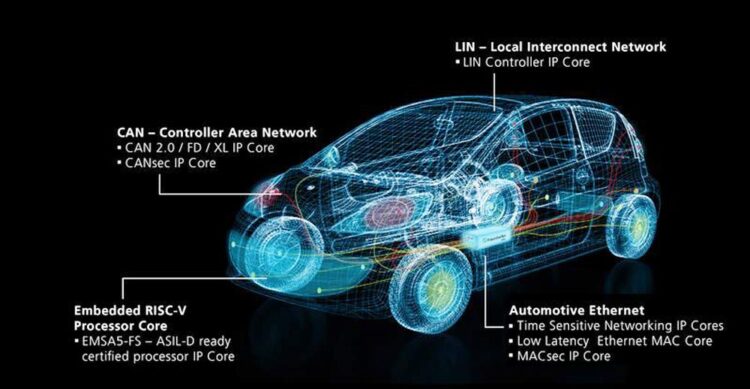The Future of Mobility

Fraunhofer IPMS Automotive IP-Cores
© Fraunhofer IPMS
Fraunhofer IPMS drives the Revolution in Vehicle Architecture.
The vehicles of the future will be automated and networked to drive autonomously in road traffic and to relieve the driver. This requires new vehicle architectures and high-performance components. The Fraunhofer IPMS is working on various research projects to create the necessary conditions.
Automated connected driving is leading to an explosion in bandwidth and computing requirements in vehicles. To cope with this, zonal arrangements with zone gateways and central computers and a corresponding networking play a key role in the vehicle’s E/E architecture. Another goal of this architecture is to reduce weight-intensive wiring and the number of ECUs. This demands an in-car backbone that meets latency, quality of service (QoS) and bandwidth requirements. Automotive Ethernet TSN promises to be a solution to these challenges.
“The development of new network architectures and associated components that meet the enormous requirements for computing power, bandwidth, and complexity in a scalable manner will make a decisive contribution to the future viability of the German automotive industry,” says Dr. Frank Deicke, Division Director Data Communication and Computing at Fraunhofer IPMS. “With its expertise in automotive Ethernet, Fraunhofer IPMS supports TSN in various research projects in which TSN components are being developed to meet future requirements.”
The “Verano” project focuses on the development of distributed and efficient data processing using AI methods for radar networks in fully automated vehicles. The aim is to optimize the computing load and the development of an AI-controlled radar sensor network using sustainable communication technologies in line with climate protection goals. In a zone architecture, the radar sensor nodes and zone gateways will be networked with the high-performance computers in the vehicle using Ethernet TSN. In the project, the institute will develop new concepts for demand-driven TSN networks based on existing TSN IP cores with a focus on real-time, very low latency, low jitter, determinism, high data rates (10GBit/s), redundancy and functional safety (ISO26262).
The “CECAS” research project is developing an automotive supercomputing platform for automated driving. The consortium is designing processors, interfaces and system architectures for this purpose. Fraunhofer IPMS contributes to the definition of the requirements for the overall system, especially in the area of vehicle networking, and contributes its expertise in Ethernet TSN communication networks. The institute designs and analyzes new TSN network technologies with data rates up to 50Gbit/s and develops automotive communication controllers for use in ASIC & FPGA systems.
About Fraunhofer IPMS
The Fraunhofer Institute for Photonic Microsystems IPMS stands for applied research and development in the fields of smart industrial solutions and manufacturing, medical technology and health, and mobility. Research focuses on miniaturized sensors and actuators, integrated circuits, wireless and wired data communication, and customized MEMS systems.
The institute has been developing automotive IP cores for more than 20 years. The CAN IP core covers the CAN 2.0, CAN FD and CAN XL standards. For automotive Ethernet, IPMS offers comprehensive solutions such as a low-latency Ethernet MAC core and a TSN IP core family. The EMSA5-FS, a RISC-V ISA-based processor IP core, was developed for 32-bit real-time applications. A special focus is on the development of safety-critical electronic systems according to ISO 26262. Many of the Fraunhofer IPMS IP cores are pre-certified ASIL-D ready and thus significantly shorten the development and approval process of the complete system.
Wissenschaftliche Ansprechpartner:
Dr. Frank Deicke – frank.deicke@ipms.fraunhofer.de
Media Contact
All latest news from the category: Automotive Engineering
Automotive Engineering highlights issues related to automobile manufacturing – including vehicle parts and accessories – and the environmental impact and safety of automotive products, production facilities and manufacturing processes.
innovations-report offers stimulating reports and articles on a variety of topics ranging from automobile fuel cells, hybrid technologies, energy saving vehicles and carbon particle filters to engine and brake technologies, driving safety and assistance systems.
Newest articles

First-of-its-kind study uses remote sensing to monitor plastic debris in rivers and lakes
Remote sensing creates a cost-effective solution to monitoring plastic pollution. A first-of-its-kind study from researchers at the University of Minnesota Twin Cities shows how remote sensing can help monitor and…

Laser-based artificial neuron mimics nerve cell functions at lightning speed
With a processing speed a billion times faster than nature, chip-based laser neuron could help advance AI tasks such as pattern recognition and sequence prediction. Researchers have developed a laser-based…

Optimising the processing of plastic waste
Just one look in the yellow bin reveals a colourful jumble of different types of plastic. However, the purer and more uniform plastic waste is, the easier it is to…



